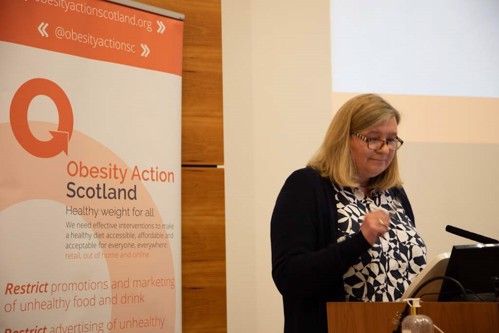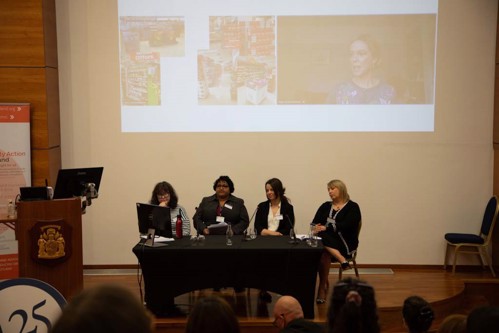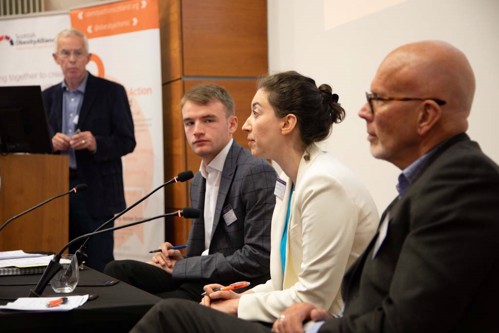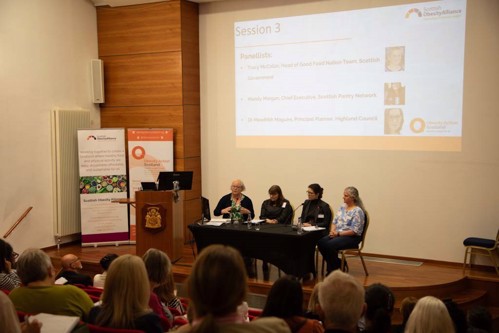Scottish Obesity Alliance and Obesity Action Scotland 'Healthy Food Environment: Time to Deliver' conference - summary and key messages
12 June 2025
Earlier this week, the Scottish Obesity Alliance, in partnership with Obesity Action Scotland, hosted the Conference on ‘Healthy Food Environment: Time to Deliver’ in Glasgow, discussing priority actions required to deliver a healthy food environment in Scotland.
The conference had a particular focus on data and evidence on regulating price and location promotions of food and drink high in fat, salt and sugar (HFSS) and inequalities in obesity; advertising and sponsorship of HFSS food and drink; and supporting delivery of a Good Food Nation for Scotland locally.
Over 80 delegates from diverse sectors across Scotland participated in the conference, including health boards, community planning partnerships, third sector organisations, public health agencies, diet and weight consultants, academics, food and agricultural system professionals, food rights activists and food standards agencies, among others. They were joined by an incredible line-up of speakers, including from England, and eminent chairs that enriched the discourse.


Minister for Public Health and Women’s Health, Jenni Minto MSP, delivered the keynote address where she outlined her commitment to improving diets and delivering a healthy food environment for all in Scotland, as well the Scottish Government taking forward action on outdoor advertising of unhealthy food in Scotland. These are important policy goals the Scottish Obesity Alliance has been seeking, and we are keen to support their early delivery.

Session 1 of the conference considered promotions of unhealthy food and their implications for inequalities. Michelle Wilson, Head of Children’s Services at Children’s Health Scotland, an active member of the Scottish Obesity Alliance, ably facilitated this session.
Dr Dionne Mackison from Public Health Scotland opened the session highlighting that there continues to be significant inequalities, with those in the most deprived areas more likely to experience obesity. Up next, Alana McDonald from Food Standards presented evidence on discretionary foods and why they need to be key target for promotions regulations – they account for around 15% of energy intake in adults and 21% in children. Significantly, she showcased that the out of home sector must also be in scope of any regulation, with the sector accounting for nearly 25% of calorie intake on average among adults in Scotland. Alana pointed out the need for action on price promotions of foods high in fat, sugar and salt (HFSS) and that these promotional restrictions need to be broad to include as many types of promotions as possible. And this is important, as these promotions influence what people purchase, consume.
Dr Shoba John from Obesity Action Scotland presented findings from Obesity Action Scotland’s recently published focus group research with parents mostly from low-income households in Scotland, which clearly highlights healthy food simply being unaffordable for many and being a driver to avail of price promotions that are mostly seen on unhealthy foods. These and placement-based promotions within stores prompted impulsive and wasteful spending. Research participants called for early action to shift promotions away from unhealthy foods towards healthier options and to make them accessible and affordable for everyone.
The final speaker in the session, Prof Christina Vogel from City St George’s University of London, presented findings from evaluation of placement-based promotions regulations in England. Key lessons recommend comprehensive regulations, to avoid retailers exploiting loopholes, such as leaving areas within stores out of regulatory scope so promotions are not shifted to these locations. Crucially, there is an opportunity to couple restrictions of unhealthy foods with a requirement to promote healthy foods.

The next session of the conference, Chaired by Professor Simon Capewell, Emeritus Professor of Public Health at the University of Liverpool, considered advertising and sponsorship of HFSS products, and the public health implications and responses. Dr Robin Ireland from the University of Glasgow opened the session, discussing the long history and widespread nature of HFSS sponsorship in sport. Sport is regarded as the perfect avenue for big food brands, using the association with sport to target children and young people and make their products more attractive.
Local outdoor advertising is a critical area of importance for Scotland, as the Scottish Government has devolved powers to take action in this area, pointed out Fran Bernhardt from Sustain. She presented lessons and experiences from outdoor advertising policies in England. In particular, evaluation of the ban on unhealthy food advertising on the Transport for London network shows positive impact not only on population health but also on advertising revenues for the council. However, there is major lobbying against such policies, and requires a strategic approach to overcome this.
The session was concluded by a powerful contribution from Ryan McShane, a Right2Food Ambassador with the Food Foundation. Ryan spoke to his experiences of growing in poverty, with limited access to healthy food, and outlined an overall sense that there is too much advertising of unhealthy food, which bombards young people with unhealthy food and shapes their diets.

The third and final session of the conference was a panel discussion session and considered delivery of a Good Food Nation locally, Chaired by Prof Mary Brennan, Chair of the Scottish Food Coalition and Director of the Living Good Food Nation Lab. Panellists included Tracy McCollin from the Good Food Nation team in the Scottish Government, Mandy Morgan from Scottish Pantry Network, an active member of the Scottish Obesity Alliance, and Dr Meadhbh Maguire from Highland Council. Key themes emerging across the panel included the lack of provision of healthy food within communities and how unhealthy food is more readily promoted, with Mandy Morgan highlighting an overexposure to unhealthy food. The role of the planning system was also discussed, with Dr Meadhbh Maguire outlining the challenges of ensuring public health is considered in planning decision making processes highlighted. Tracy McCollin highlighted the importance of understanding what the Good Food Nation legislation can do, with the National Plan offering a framework for local action.

Across all of these key themes explored in the conference, taking action on each of them is critical to delivering a healthy food environment and the time to do so is now! With levels of obesity in adults and children continuing to rise in Scotland, we must take urgent, comprehensive policy action to improve the food environment.
Delegates, speakers, and chairs - your participation enriched the conversation. We hope it offered learnings and insights to action in the context of your work. Scottish Obesity Alliance looks forward to working with all partners in taking forward action points that have emerged from the conference deliberations.


Thanks to Cancer Research UK funding that enabled the conference, alongside the support from Scottish Government.
For more information on the Scottish Obesity Alliance, including details on how to become a member, please visit the about us section of the website.
